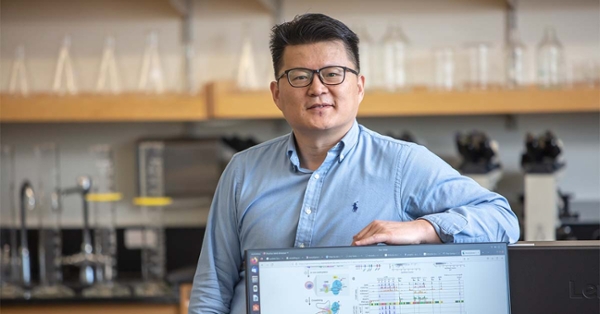NSF CAREER Award: Rowan scientist aims to improve methods used for studying individual cells
NSF CAREER Award: Rowan scientist aims to improve methods used for studying individual cells

The nucleus of a cell is the command center, and within that command center is a material called chromatin, made of DNA and protein. Found within the cells of humans and other complex organisms, chromatin regulates essential processes including DNA replication, repairing damaged DNA, and gene transcription. Studying the dynamics of chromatin can help researchers better understand basic biology, disease and therapeutic interventions. In order to get a clearer picture of how chromatin behaves within a single cell, Rowan University’s Yong Chen, Ph.D., is developing improved methods of looking at these chromatin interactions.
With $698,684 in funding over the next five years from the National Science Foundation’s Faculty Early Career Development Program (CAREER) Award, Chen and an interdisciplinary team of students will use cutting-edge experiments to capture 3D chromatin interactions within individual cells and develop advanced statistical methods for analyzing the resulting data.
“This project is a perfect opportunity to train our students with interdisciplinary research skills, especially for those students in STEM fields,” said Chen, an assistant professor of biological and biomedical sciences.
The NSF CAREER program offers the independent federal agency’s most prestigious awards to early-career faculty.
“Dr. Chen’s CAREER award will support innovative computational biology research on the organization of chromosomes in individual cells, to better understand how these cells become cancerous,” said Vojislava Pophristic, Ph.D., dean of the College of Science & Mathematics. “A leader in the field of bioinformatics, Dr. Chen is paving a way for Rowan to become a nationally recognized hub for research at the interface of data and biological sciences.”
The scientific method used to examine chromatin in a cell is called single-cell Hi-C. But the data produced is lacking, limiting the ability of researchers to clearly determine how the cell behaves. Chen will study how to improve the experimental quality of this data, as well as build tools to better study the datasets. The team will also construct a database to publish their results, making them available to other scientists. The work will span multiple disciplines including computer science, statistics, bioinformatics and biology.
“We would like to improve the single-cell Hi-C protocols and quality of data,” Chen said. “And from a computational perspective, we would like to set up a suite of tools for data analysis.”
“The CAREER award is NSF’s premier program supporting an integrated approach to research and education by early-career faculty,” said Jean Gao, a program director at the NSF. “By developing tools that can be used by a broad range of experimental and computational biologists to understand fundamental questions about gene regulation and cell function at play in the brain and in cancers and pairing that with opportunities for undergraduate and high school students and educational outreach, this work is a prime example of CAREER award-worthy efforts.”